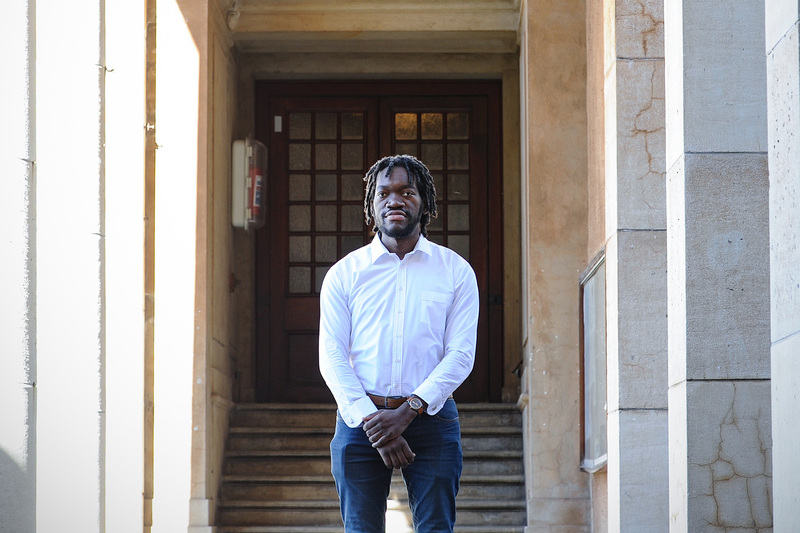UCT team nets inaugural agri-entrepreneurship prize
12 August 2021 | Story Helen Swingler. Photos Lerato Maduna. Read time 8 min.
University of Cape Town (UCT) PhD candidate Julian Kanjere and his team have won the inaugural Inqola FEED Innovation Prize for their FoodPrint platform. This is an agritech start‑up that’s building a digital and blockchain‑enabled food traceability platform for producers, consumers and others involved in food supply chains.
The prize was created by Food, Equity, Equality and Democracy (FEED) in partnership with Simanye Trust, Southern African Food Lab, iZindaba Zokudla, Seriti Institute, the University of Johannesburg's Process, Energy and Environmental Technology Station, and Food for Mzansi. All have expertise in agri‑entrepreneurship, urban agriculture, innovation and social impact.
Kanjere, who is doing his doctorate through the UCT School of Economics, is chuffed with the recognition.
“It is humbling to be named as a winner in a global competition. To be awarded first prize in a competition judged by such an experienced and diverse panel gives us the reassurance that we are working on a relevant problem – and headed in the right direction.”

Kanjere said that when he enrolled in the MPhil in FinTech at UCT at the end of 2019, course convenor Associate Professor Co-Pierre Georg told the class that he expected the students to come up with ideas that could change the world.
That thinking underscores Vice-Chancellor Professor Mamokgethi Phakeng’s promise, bound up in Vision 2030: “We are not here to wait to be disrupted, but we are going to disrupt ourselves and lead the change!”
Opportunities like these also create chances for students to exercise creativity outside the lecture theatre, validate ideas on the global stage and build innovation capital.
“For African students in particular, they provide an opportunity to build diverse international networks and demonstrate that we can compete globally,” said Kanjere.
He will use his R100 000 prize money to formalise FoodPrint operations and administration, which is “long overdue”.
“The prize money will be used to put in place the right systems and admin, build new features and execute go‑to‑market strategies.”
Developing an innovative mind
The award adds to two others in the innovation arena for Kanjere. In 2020 he won second prize in The Pitch for student entrepreneurs, and he was one of four UCT winners in Schmidt Futures’ global Reimagine Challenge 2020.
He attributes his curious and strategic mindset to years of developing problem‑solving skills; playing chess as a child in Zimbabwe, and through his love of mathematics.
He obtained his honours in computer science at UCT and then worked in industry as a software developer. But it was UCT’s launch of Africa’s first MPhil in Financial Technology in 2017 that caught his eye.
“Academia often gets a bad rep for not keeping up with advances in industry.”
“I immediately knew it was something I wanted to study, especially as I was getting interested in blockchain technology and the degree looked to have a strong innovation and practical component. Academia often gets a bad rep for not keeping up with advances in industry, and so the relevance and timeliness of the MPhil in FinTech was especially encouraging.”
Though Kanjere’s FoodPrint platform was developed during his MPhil studies, it is still under active development, he said.
“For the MPhil, our hypothesis was that we could use blockchain to enhance transparency and traceability in food supply chains. This was the essence of the pilot we carried out at the Oranjezicht City Farm Market. However, we quickly learnt that beyond traceability, we needed a stronger value‑add to incentivise farmer and stakeholder participation.”
Having fulfilled the MPhil research requirement, Kanjere and his team are now building a robust data capturing platform for farmers, which will be accessible via WhatsApp, and building a digital marketplace to connect farmers to consumers. There are also plans to help farmers access alternative financial services via the blockchain.
“We have also participated in a food system programme organised by Oribi Village (a social impact incubator), engaged with the French embassy, French South African Agricultural Institute and the Launch Lab at Stellenbosch University,” he added. “These have all helped us refine our hypothesis and grow our network.”
Alternative supply chains vital
The threat to supply chains, especially food supply chains, was highlighted during the recent unrest that swept KwaZulu‑Natal and areas of Gauteng.
It points to an urgent need to support alternative food chains, said Kanjere.
“One of the ways for South Africa to rebuild and recover, both from the COVID‑19 pandemic and from the recent unrest, is by supporting local businesses such as local farmers, local restaurants, etc. At FoodPrint, we are advocates for short supply chains and buying local, which in turn strengthens local economies. So, we have the potential to positively contribute to the rebuilding efforts and as a by‑product, become more valuable.”
But blockchain technology is finding its niche in many areas, he said, citing examples such as FlexFin, which is building digital identities for Africa; Tracr, developed by the De Beers Group, an end‑to‑end diamond traceability project from discovery to retail; Uhuru Wallet, which enables payment of bills and transfer of value via blockchain technology; and the Sun Exchange, a South African‑based marketplace that allows anyone in the world to invest in solar energy projects in South Africa using Bitcoin.

The future is wide open, said Kanjere.
“Many other blockchain‑based projects, such as digital COVID‑19 vaccination wallets, donation tracing platforms, procurement integrity platforms, are either in research or proof‑of‑concept phases.”
Africa, a springboard for innovation
With innovative thinking an integral part of UCT’s Vision 2030, Kanjere said that the university has provided an important springboard for young Africans.
“Africa is open for business. We have the fastest‑growing middle class in the world and this increases demand for goods and services.”
He is excited about how this is likely to unfold in the next decade.
“Will we be the next global economic powerhouse? Recently, we have seen a handful of unicorns, or start‑up companies with valuations greater than $1 billion, emerge from Africa, such as Interswitch (Nigeria), Flutterwave (Nigeria), and Go1 (South Africa). Go1 is especially worth mentioning as it was founded by Melvyn Lubega, a UCT alumnus.”
“Innovation is very close to my heart and this is what makes me all the more excited at how Africa can leverage technology to solve problems.”
With his technology background, Kanjere is well aware of the scale and potential that technology can have, especially on economic well‑being.
“Innovation is very close to my heart and this is what makes me all the more excited at how Africa can leverage technology to solve problems and become more competitive on the global stage.”
That UCT has created opportunities and platforms, such as the UCT Graduate School of Business Solution Space, The Pitch, the Hasso Plattner School of Design Thinking foundation programme, and the Student Entrepreneurship Week, to foster and drive student innovation is good for the future – and for realising Vision 2030, he added.
“Coming back to Go1, it is a perfect example of what UCT students can become and what they can aspire to. In addition, universities are key innovation players given that they are home to intellectual capacity and human potential and are generally a trust anchor in both the public and private sector. They are, therefore, well positioned to drive innovation.”
What’s next for FoodPrint?
“The major focus for now is to scale up FoodPrint. We have been engaging with various players in industry in this regard; safe to say we have a couple of irons in the fire!”
 This work is licensed under a Creative Commons Attribution-NoDerivatives 4.0 International License.
This work is licensed under a Creative Commons Attribution-NoDerivatives 4.0 International License.
Please view the republishing articles page for more information.










